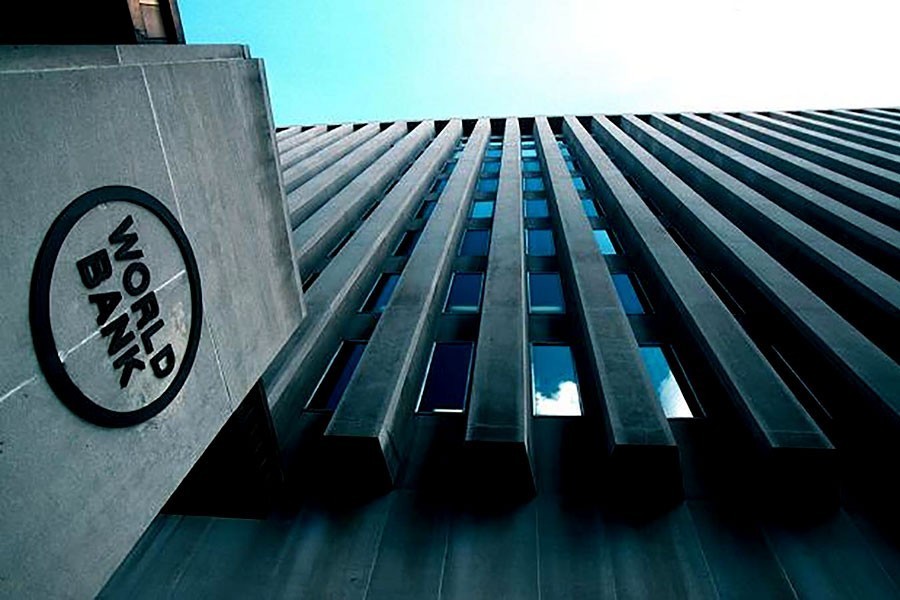Bangladesh has been performing well on the economic front, if not on the political front, over the past decade, growing at more than 7.0 per cent on an average. The outstanding development in socio-economic sectors has been widely acclaimed, although occasionally questioned on the quality issues by certain quarters. In terms of per capita income and non-income indicators such as education, health, women empowerment, the performance marked a march over our neighbours. Political instability, however, looms large on the horizon on the eve of the general election due to be held in December. Besides, the two consecutive floods that devastated crops coupled with influx of Rohingyas rocked the boat, if not capsized. Critics are of the view that the economy could nosedive, given the present and upcoming adversities arising out of the general election.
The World Bank's (WB) recent most update on Bangladesh economy, a routine remark by the Washington-based multilateral lender, under the headline 'Bangladesh Development Update: Powering the Economy Efficiently', seemingly takes a positive view of the economy by painting a pleasant picture. The economy remained resilient bagging at least 7.0 per cent growth for the fourth consecutive years, according to government sources. Although lower than that of government estimates, the WB sees a boost in the growth rate resulting from increased public spending on infrastructure, along with robust private investments, exports and remittance inflows. The multilateral lender forecasts the GDP growth in fiscal 2018-19 would be 7.0 percent, down from 7.86 percent registered for fiscal 2017-18. According to the country director of the WB, "the country is among the 10 fastest growing economies in the world. Apart from a favourable exchange rate, the rising shipment of higher valued items, brighter image of Bangladesh's garment sector after remediation, automation of production and relative political calm combined with rebound in the economies of major export destinations from the shocks of Brexit and general elections should help prop up growth". Bangladesh economy has been growing in size mostly adducible to the growth of industry and construction sectors despite some pressures creeping up in macroeconomic indicators. The report forecasts few favourable factors pushing the economy ahead. First, a good number of new factories are expected to come into operation in the next couple of years, with entrepreneurs investing to capture the shifted work orders from China. Second, remittances turnaround is expected to persist as Gulf Cooperation Council economies benefit from higher oil prices and incentives for remitting through informal channels remain weak. Third, private investment is likely to maintain the recent 8-9 percent growth induced by progress on infrastructure development prospects, strong domestic demand and stronger global markets. "These, in addition to the country's reforming business environment, inform our forecast for Bangladesh to creep towards achieving a 7.0 per cent growth rate in fiscal 2019-20."
However, there are some risks for the economy that need to be faced with reforms of short, medium and long-term nature. The short-term ones include, containing inflation and keeping exchange rate at an appropriate level, market-based interest rate, modernisation of tax administration to beef up revenue collection, and rationalise government spending. The medium-term reforms would embrace export diversification, ensuring efficiency in power utilisation, and raising private investment/GDP ratio. The long-term challenges to be met with reforms are human resources development, urban management, inclusive development and protection of environment.
"Inflation is likely to accelerate with rising aggregate demand resulting in part from election-related increase in private spending, an expansionary fiscal policy and depreciating exchange rate. .... The performance of the banking sector and solvency of some financial intermediaries remain a concern because of limited action to address defaults, improve risk management and strengthen corporate governance."
Two of the most critical concerns on air during the tenure of the present government is looting and laundering money from the banking sector. It is thus no wonder that the fragile banking sector came under close review by the WB: "Persistent weaknesses owe largely to the legacy of loans of larger borrowers, who lack incentives to repay, given legal limitations on recoveries." The increased imports in recent years are seen with suspicion by arguing that, a 25 per cent import increase in a financial year is rare. It may be mentioned here that over-invoicing of imports has been shown as a source of money laundering by eminent economists for a pretty long time. The growth of imports of raw materials and capital machinery, allegedly, does not match the industrial growth.
By and large, the WB is of the view that the economy performed reasonably well and likely to do better in future but the sustainability of the success hinges on a number of reforms to be undertaken to tackle the upcoming challenges. Crises and opportunities both loom large on the horizon. A judicious mix of fiscal and monetary policy combined with commitments to reforms could bring good dividends for the economy. Socio-economic and institutional reforms has long been on the agenda only to be bypassed by the policymakers in the past. It is time to take it up seriously if successes achieved so far have to be sustained.
Abdul Bayes is a former Professor of Economics at Jahangirnagar University.
[email protected]/[email protected]


